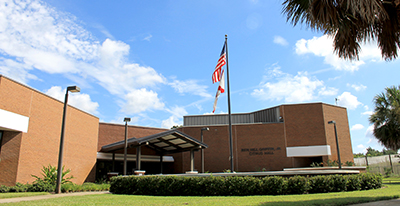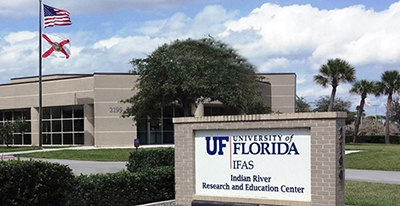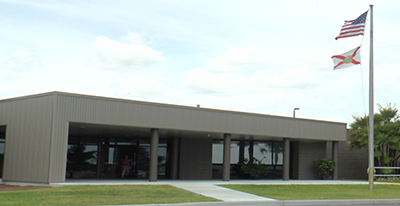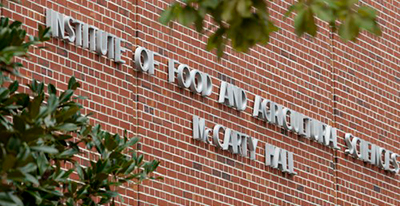Research Priorities
UF/IFAS CITRUS RESEARCH AND EDUCATION CENTER
Lake Alfred, Florida

A major objective of the Citrus Research and Education Center’s research is to provide the basic foundation for sustainable, economically viable solutions to huanglongbing disease (a.k.a. greening or HLB). The realistic threat of exotic disease introduction provides an opportunity to develop proactive programs addressing management and control.
Critical research opportunities include development of new citrus production systems; biorational pest control strategies; site-specific and regional water management programs; innovative technologies and approaches for sustainable citrus production, processing, and food safety; and novel citrus improvement strategies.
UF/IFAS INDIAN RIVER RESEARCH AND EDUCATION CENTER
Ft. Pierce, Florida

Research at the Indian River Research and Education Center addresses sustainable agriculture, natural resources, and urban development and their interactions with the environment. Research directions include multidisciplinary, collaborative programs in best management practices for fresh citrus fruit production and management; soil and water quality; soil fertility and nutrient management; postharvest quality and handling of fresh produce; entomology; biological control of invasive plants and insects; plant pathology; bioinformatics; and aquaculture.
Core Programs of the Future
- Citrus horticulture (plant nutrition, root health, precision irrigation, pest management)
- Postharvest physiology and commodity management
- Genome-informed diagnostics of plant pathogens
- Biological control of invasive plants and insects
- Soil and water management for sustainable agriculture
- Environmental quality and restoration of wetlands and estuaries
- Bait fish and food fish production systems
- Interaction of sustainable agriculture and environmental quality
UF/IFAS SOUTHWEST FLORIDA RESEARCH AND EDUCATION CENTER
Immokalee, Florida

The Southwest Florida Research and Education Center will address agricultural and natural resource issues that arise from the complex interplay among agricultural, urban, and natural systems. The overarching goal of the center’s research programs is to sustain a profitable agriculture industry, vital environmental services and quality of life in southwest Florida. Major research opportunities are in areas such as land and water use; pests and diseases of citrus and vegetables; alternative crops; improved crop production systems; and new technologies that more efficiently allocate resources for optimized agricultural productivity while protecting and conserving the natural environment and resources of the region.
Core Programs of the Future
- Maximizing sustainability and profitability in production agriculture
- Alternative crops and enhanced uses of land-biofuels and ecosystem services
- Sustainable pest management systems and biological control
- Improved agricultural technologies and cropping systems/precision agriculture
- Water quality, quantity and conservation
- Enhanced soil microbial communities/improved soil health
- Agricultural and natural resource economics
UF/IFAS – Gainesville Campus
Gainesville, Florida

The University of Florida’s main campus in Gainesville hosts a number of scientists engaged with citrus research. From agricultural and biological engineering to entomology and nematology to horticulture and microbiology and cell sciences. Researchers are engaged in plant breeding, pathogen control, water irrigation, post-harvest engineering, citrus economics, food safety and nutrient management studies. They collaborate with researchers at the three Research and Education Centers.

